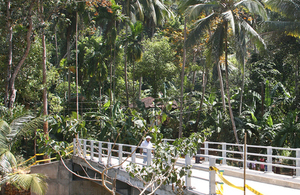Public concern for nature reaches all-time high
More people than ever before are concerned about damage to nature, new national statistics published today (3 September 2019) by Natural England show.
In the world’s biggest scientific study of its kind, Natural England’s ‘Monitor of Engagement with the Natural Environment’ (MENE) report shows that nine out of ten adults in England are concerned about increasing threats to the natural environment, with nearly two-thirds specifically worried about biodiversity loss.
While more people are spending time in nature than ever before, the research indicates clear inequalities in opportunity for engagement. Children from the most deprived areas are 20% less likely to spend time outside than those in affluent areas, while 70% of children from white backgrounds spend time outside once a week compared to 56% of children from black, Asian and ethnic minority backgrounds.
The research also shows how important local parks and greenspaces are to the nation’s mental and physical wellbeing, with health and exercise the main reason why adults spend time outside and green spaces in towns and cities the most frequently visited natural environments.
Marian Spain, Interim Chief Executive of Natural England, said:
The overwhelming evidence published today makes clear the priority the public give to investing in nature’s recovery. Wildlife and greenspaces are hugely important for people, providing them with places to exercise, socialise, learn and experience the wonder of the natural world. Natural England is committed to restoring nature by working with partners and the public to help deliver Government’s 25 year Environment Plan.
This research also underlines how important it is that we create new opportunities for people to connect with nature wherever they live and whatever their age. We want everyone to enjoy the many benefits nature brings and also to take part in caring for their environment.
In its tenth year, MENE is the longest-running survey of its kind which tracks changes in how people use and relate to the natural environment. It comes during the Year of Green Action, a year-long drive to inspire and support people to connect with and improve the natural environment.
The report also found:
- Use of our natural environment is the highest on record – with visits to the natural environment up from an estimated 2.9 billion visits in 2009/10 to almost 4 billion in 2018/19;
- Most people’s experience of the natural environment is close to home, on their doorstep. This is especially key for people living in the most deprived areas. For example, children living in the 10% most deprived areas of England are most likely to visit urban greenspaces (62%) compared with only 30% who visit the countryside; and
- Most visits to nature are taken on foot and are increasingly close to home, with 44% of visits taken within 1 mile.
Natural England is committed to promoting health and wellbeing through the natural environment, helping more people from a wider cross-section of society benefit directly from the environment. It is currently working with the Department for Education and Department for Environment, Food and Rural Affairs (Defra) on the Children and Nature programme to improve the physical and mental wellbeing of children from disadvantaged backgrounds. The includes delivering green school grounds, supporting pupil visits to green spaces and improving woodland outreach activities.
The MENE survey is funded by Natural England, with support from Defra. First commissioned in 2009, it provides a wealth of evidence relating to outdoor recreation, behaviour and attitudes.
This year, for the first time, Natural England has created an interactive map allowing users to see the results for their specific area and better understand how their community uses its local natural environments. The raw data has been provided for each Local Authority to allow more advanced analysis. A short story map providing infographics of key things learnt over the decade of MENE is also available.
Natural England uses the research to understand how people use, enjoy and are motivated to protect the natural environment and to help monitor changes in use of the natural environment over time.
More information:

